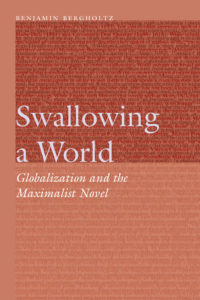NEWS
Q & A with Dr. Ben Bergholtz: A ‘novel approach’ to his first book
 Dr. Benjamin Bergholtz, assistant professor of English at Louisiana Tech University, likes big books and he cannot lie.
Dr. Benjamin Bergholtz, assistant professor of English at Louisiana Tech University, likes big books and he cannot lie.
Give him a chance to explain, and he thinks you might too.
In a pair of upcoming events, Bergholtz will read from, visually explain, and take questions to clarify his ambitious first book, Swallowing a World: Globalization and the Maximalist Novel. Published Oct. 1 by University of Nebraska Press, the book makes an argument, he says, for the benefits of reading long and complicated novels.
The first reading is 4 p.m. to 5 p.m. Thursday, Oct. 10 in GTM Room 105 on Tech’s campus. The second is 4 p.m. to 7 p.m. Tuesday, Oct. 29 at No. 9 Books, 301 N. Trenton in Ruston.
We spoke to the accommodating and personable Bergholtz about novels in general, the “maximalist” label, and his book, which has been called “powerful and elegant,” “sharp and compelling,” and an informed argument for pursuing a type of fiction that can offer our “exhausted imaginations a reading process that can sustain and inspire.”
What IS a ‘maximalist’ novel?
Bergholtz: The simplest answer is they are big, long, ambitious, experimental novels; my book is about this genre of contemporary fiction which I’ve always loved but found (in graduate school) wasn’t accurately represented in academic scholarship.
What is the scholarship that existed when you began writing the book, and what was its impact regarding your book?
Bergholtz: The scholarship has changed some since then, but it was almost exclusively about white American male authors (e.g., Thomas Pynchon, Don DeLillo, David Foster Wallace), and I wrote the book, in part, to attend to the authors all over the world—Salman Rushdie in India, Zadie Smith in England, Marlon James in Jamaica, Namwali Serpell in Zambia—who were writing these same sort of sweeping, interconnected books. I believe the initial “inspiration” came when I read two of these books—Wallace’s Infinite Jest and Rushdie’s Midnight’s Children the first summer of graduate school; I thought, these books are doing similar, interesting, exasperating (as in, a challenge to read) things, and critics haven’t been putting them together. When I did that—first in my dissertation, then in the book—I concluded that the maximalist novel is a global genre and an aesthetic response to globalization.
From either those conclusions or that overall idea, what argument(s) did you think you could contribute through a book?
Bergholtz: Perhaps most interestingly (in my view), is the conclusion that maximalist novels don’t just represent/address/imagine the effects of globalization (e.g., information overload, the legacy of colonialism and neocolonialism, the rise of neoliberalism, the resurgence of fundamentalism, and climate change, amongst others), but that their formal presentation embodies/mimics/recreates these problems in the reader. So, to read a book like A Brief History of Seven Killings is to both see how Jamaicans were treated as transnational commodities during the Cold War—i.e., their lives were reduced to abstraction by the U.S. and Soviet Union, who fought over the island as a Cold War proxy battle—but also to be forced to think about your own engagement with this brutally violent book, which, as a product bought and sold, is also a transnational commodity.
What are the best five or six history books you’ve enjoyed, off the top of your head?
Bergholtz: Well, since I’m more of a literary critic than a historian, I’ll list five books that informed my thinking about history and, for lagniappe, five novels that engage in fascinating (if challenging) ways with history.
First, theoretical studies of history:
Orientalism by Edward Said
On the Philosophy of History by Walter Benjamin
Metahistory by Hayden White
Minima Moralia: Reflections on Damaged Life by Theodor Adorno
Specters of Marx by Jacques Derrida
And, five novels that deal with history:
Absalom, Absalom by Faulkner
Austerlitz by W.B. Sebald
Open City by Teju Cole
Beloved by Toni Morrison
The Book of Night Women by Marlon James
For more information and to purchase the book:
Recent Comments